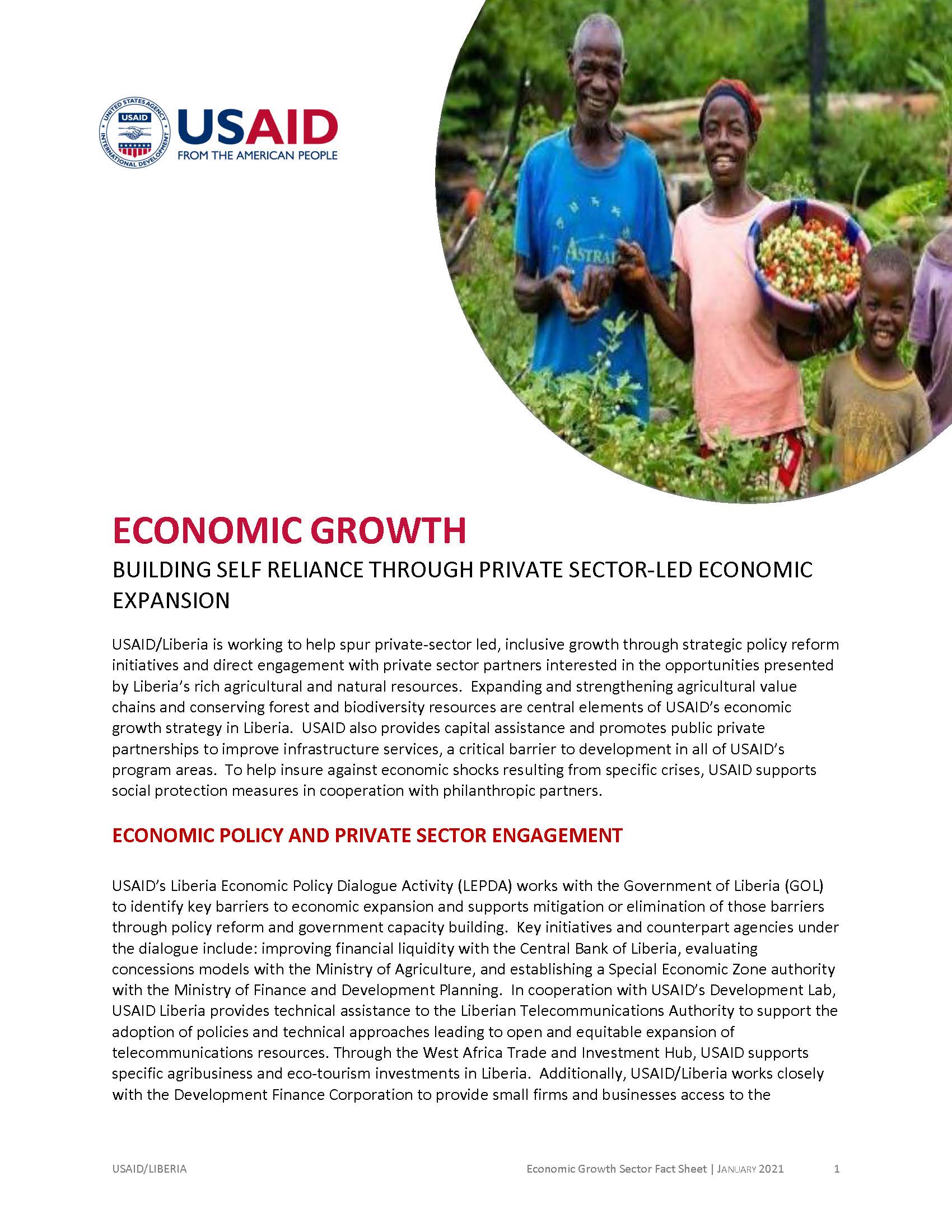Speeches Shim
Economic Growth ![]() (pdf - 197k)
(pdf - 197k)
USAID/Liberia is working to help spur private-sector led, inclusive growth through strategic policy reform initiatives and direct engagement with private sector partners interested in the opportunities presented by Liberia’s rich agricultural and natural resources. Expanding and strengthening agricultural value chains and conserving forest and biodiversity resources are central elements of USAID’s economic growth strategy in Liberia. USAID also provides capital assistance and promotes public private partnerships to improve infrastructure services, a critical barrier to development in all of USAID’s program areas. To help insure against economic shocks resulting from specific crises, USAID supports social protection measures in cooperation with philanthropic partners.
ECONOMIC POLICY AND PRIVATE SECTOR ENGAGEMENT
USAID’s Liberia Economic Policy Dialogue Activity (LEPDA) works with the Government of Liberia (GOL) to identify key barriers to economic expansion and supports mitigation or elimination of those barriers through policy reform and government capacity building. Key initiatives and counterpart agencies under the dialogue include: improving financial liquidity with the Central Bank of Liberia, evaluating concessions models with the Ministry of Agriculture, and establishing a Special Economic Zone authority with the Ministry of Finance and Development Planning. In cooperation with USAID’s Development Lab, USAID Liberia provides technical assistance to the Liberian Telecommunications Authority to support the adoption of policies and technical approaches leading to open and equitable expansion of telecommunications resources. Through the West Africa Trade and Investment Hub, USAID supports specific agribusiness and eco-tourism investments in Liberia. Additionally, USAID/Liberia works closely with the Development Finance Corporation to provide small firms and businesses access to the operating and investment capital they need to sustain and expand productive economic activities and employment in Liberia. USAID supports credit guarantees with AccessBank and Afriland Bank for loans in the agriculture, health, and education sectors.
AGRICULTURE AND FOOD SECURITY
USAID’s agricultural programs are aligned with the Feed the Future Initiative. Activities aim to increase agricultural production and rural incomes; stimulate private enterprise growth and investment; reduce post-harvest losses; improve the quality of local produce; and prevent malnutrition through nutrition-sensitive interventions. USAID/Liberia has invested in rice and cassava mills, which has opened wholesale markets for farmers and increased the supply of Liberian produce in markets and stores.
USAID also implements social protection measures for some of Liberia’s most vulnerable and food insecure populations. Working with the GOL, NGOs and philanthropic partners, USAID is helping to create and verify a registry of vulnerable individuals, and providing unconditional cash transfers to thousands of food insecure and COVID-19 affected households.
NATURAL RESOURCES MANAGEMENT
More than 40 percent of the remaining Upper Guinean Rainforest lies within Liberia’s borders. This vast forest is home to endangered Western Chimpanzees, Forest Elephants, the Pygmy Hippopotamus, and countless other rare and yet to be discovered species. USAID supports biodiversity conservation in Liberia by improving livelihoods for forest communities, building community and national-level forest management capacity, supporting establishment of community forests, and strengthening Liberia’s protected area network. In partnership with the U.S. Forest Service, USAID Liberia is developing and deploying a conservation focused curriculum at the Forestry Training Institute (FTI), a two-year vocational school. Additionally, USAID has made substantial infrastructure upgrades at FTI.
INFRASTRUCTURE
USAID infrastructure interventions focus on increasing access to essential services and provide underpinning support to our overall development strategy in all program areas including: economic growth, education, health, and governance. Our energy sector activities align with the Power Africa Initiative objective of increasing energy access through private sector led growth and investments. USAID provides technical assistance to the Liberia Electricity Corporation (LEC) and the GOL to establish management services contracts with private sector entities to improve the LEC’s management and operations so that it achieves commercial and financial viability. USAID/Liberia has also implemented renewable energy pilot programs, and is currently working on a power grid extension project between Ganta and Gbarnga that provides electricity to more than 2,000 households and several major health, educational and agricultural anchor institutions. In the water sector, USAID has introduced a public-private partnership model for providing improved water service delivery to more than 30,000 beneficiaries in the three county capital cities of Robertsport, Sanniquellie, and Voinjama. Current efforts are focused on extending the water network distribution system in these cities to increase the customer base and sustainability of the water treatment facilities.


Comment
Make a general inquiry or suggest an improvement.